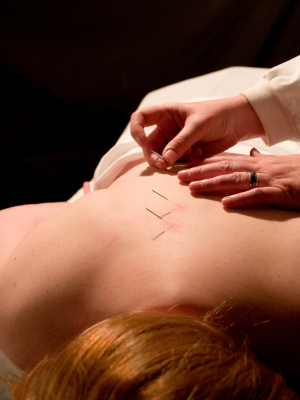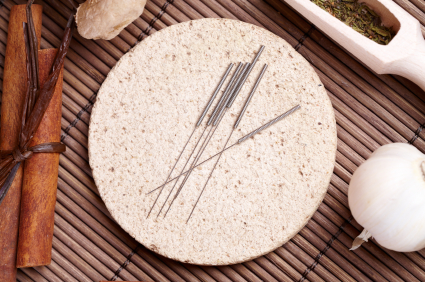ACUPUNCTURE: WHAT IS IT?
Acupuncture is a method of encouraging the body to promote natural healing and to improve functioning. Inserting needles and applying heat or electrical stimulation at very precise acupuncture points does this.
HOW DOES ACUPUNCTURE WORK?
The classical Chinese explanation is that channels of energy run in regular patterns through the body and over its surface. These energy channels, called meridians, are like rivers flowing through the body to irrigate and nourish the tissues. An obstruction in the movement of these energy rivers is like a dam that backs up in others.
Needling the acupuncture points can influence the meridians; the acupuncture needles unblock the obstructions at the dams, and re-establish the regular flow through the meridians. Acupuncture treatments can therefore help the body’s internal organs to correct imbalances in their digestion, absorption, and energy production activities, and in the circulation of their energy through the meridians.
 The modern scientific explanation is that needling the acupuncture points stimulates the nervous system to release chemicals in the muscles, spinal cord, and brain. These chemicals will either change the experience of pain, or they will trigger the release of other chemicals and hormones that influence the body’s own internal regulating system.
The modern scientific explanation is that needling the acupuncture points stimulates the nervous system to release chemicals in the muscles, spinal cord, and brain. These chemicals will either change the experience of pain, or they will trigger the release of other chemicals and hormones that influence the body’s own internal regulating system.
The improved energy and biochemical balance produced by acupuncture results in stimulating the body’s natural healing abilities, and in promoting physical and emotional well-being.
HOW MANY TREATMENTS WILL I NEED?
The number of treatments needed differs from person to person. For complex or long-standing conditions, one or two treatments a week for several months may be recommended. For acute problems, usually fewer visits are required
ARE THERE ANY SIDE EFFECTS TO THE TREATMENT?
Usually not. As energy is redirected in the body, internal chemicals and hormones are stimulated and healing begins to take place. Occasionally the original symptoms worsen for a few days, or other general changes in appetite, sleep, bowel or urination patterns, or emotional state may be triggered. These should not cause concern, as they are simply indications that the acupuncture is starting to work. It is quite common with the first one or two treatments to have a sensation of deep relaxation or even mild disorientation immediately following the treatment. These pass within a short time, and never require anything more than a bit of rest to overcome.
DO THEY HURT?
People experience acupuncture needling differently. Most patients feel only minimal pain as the needles are inserted; some feel no pain at all. Once the needles are in place, there is no pain felt. Acupuncture needles are very thin and solid and are made from stainless steel. The point is smooth (not hollow with cutting edges like a hypodermic needle) and insertion through the skin is not as painful as injections or blood sampling. The risk of bruising and skin irritation is less than when using a hollow needle. The Needles are used only once and are disposed safely so there is no risk of infection from the treatments.
DOES ACUPUNCTURE REALLY WORK?
Yes. In the past 2,000 years, more people have been successfully treated with acupuncture than with all other health modalities combined. Today acupuncture is practiced widely in Asia, the Soviet Union, and in Europe. It is now being used more and more in Ireland by patients and physicians. Acupuncture treatments can be given at the same time other techniques are being used, such as conventional Western medicine, osteopathic or Physical Therapy adjustments. It is important that your acupuncturist knows everything that you are doing, so she can help you get the most benefit from all your treatments.
Patient Safety
All acupuncture needles used are CE marked, single use (one needle per point), sterile and disposable. The use of acupuncture and TCM is entirely safe and free from harmful side effects.

